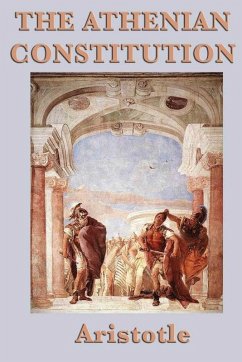Ancient accounts of Aristotle credit him with 170 Constitutions of various states; it is widely assumed that these were research for the Politics, and that many of them were written or drafted by his students. Athens, however, was a particularly important state, and where Aristotle was living at the time; it is plausible that, even if students did the others, Aristotle did that one himself, and possible that it was intended as a model for the rest. However, a number of prominent scholars doubt that it was written by Aristotle. If it is a genuine writing of Aristotle, then it is of particular significance because it is the only one of his extant writings that was actually intended for publication. Because it purports to supply us with so much contemporary information previously unknown or unreliable, modern historians have claimed that "the discovery of this treatise constitutes almost a new epoch in Greek historical study."
Dieser Download kann aus rechtlichen Gründen nur mit Rechnungsadresse in A, B, BG, CY, CZ, D, DK, EW, E, FIN, F, GR, HR, H, I, LT, L, LR, M, NL, PL, P, R, S, SLO, SK ausgeliefert werden.

